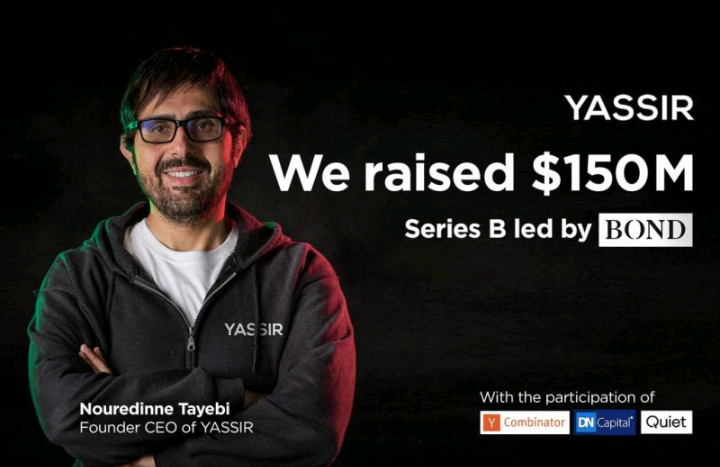Yassir, an African super app platform that provides on-demand services including ride-hailing, food and grocery delivery, and payments, has raised $150 million in Series B investment, which is five times as much as it raised in its prior priced round last November.
Bond, the growth-stage company Mary Meeker separated from Kleiner Perkins in 2018, spearheaded the investment. DN Capital, Dorsal Capital, Quiet Capital, Stanford Alumni Ventures, and Y Combinator via its Continuity Fund are some of the other key investors in the growth round.
Since its founding in 2017, the African firm, which debuted in Algeria, has now raised $193.25 million. Yassir considers itself the most valuable startup in North Africa and one of the highest-valued businesses in Africa and the Middle East, where it expects to grow in the upcoming months, despite its valuation yet unknown.
The goal of Yassir, founded by CEO Noureddine Tayebi, was to create a super app with access to services that consumers in the French-speaking Maghreb region, which includes Algeria, Morocco, and Tunisia, had little or no access to on a single platform. Its execution has been flawless thus far. In addition to providing ride-hailing, shopping, and food delivery services (via Yassir Express) in 45 locations across six countries, the company, according to this analysis, accounts for three out of every five on-demand operations in Algeria, its first market.
Read also: Roboost Secures $60,000 in seed funding
What Yassir Has Accomplished
Due to this controlled growth, Yassir has come closer to its overall goal of offering banking and payments. According to Tayebi, offering on-demand services for food and transportation was the starting point that allowed Yassir to win consumers’ trust for this initiative. Tayebi contends that this is one reason why the majority of Africans lack access to banking.
For context, consider that over 65% of Moroccans, one of Yassir’s key markets, do not have a bank account and that 57% of Africans as a whole do not have any bank account, per a 2018 McKinsey research on growth and innovation in African retail banking. The report also notes that 40% of Africans who have access to banking prefer to transact online. In light of the fact that 50% of people in Africa have access to the internet, Yassir’s thesis holds that offering customers a mobile banking solution as part of a larger suite of services will satisfy a crucial need in that market.
The Chief Executive of Yassir said in an interview: “Our business model from day one was a super app model and getting into payments. When we first started, the observation was that most people were unbanked, and the number one reason is that people don’t trust the banking systems here for various reasons.”
“We thought we could provide on-demand services that solve immediate needs around where people spent their money. We knew if we executed well, we could have a large user base that subconsciously trusts us, which we felt was pertinent to offering payment services.”
More Details on Yassir
Yassir is an all-in-one ecosystem software which offers its users a single point of management for all of their daily activities, from getting to work to ordering groceries and meals. Its banking services support this multifaceted marketplace ecosystem, which has 100,000 partners, drivers, couriers, merchants, suppliers, and wholesalers, as well as 8 million users (more than 2.5 times the number from the previous year). Yassir is utilising this network for its payment play built on top wallet provision and deployment of drivers and couriers as money agents. The network also contains a B2B e-commerce retail element that links fast-moving consumer goods (FMCG) suppliers with merchants.
Five firms with an emphasis on Africa have closed mega-rounds this year, which are investment rounds larger than $100 million. Yassir is one of them. On the shortlist, which included ten businesses as of the previous year, the self-described most valuable North African startup joins Flutterwave, Wasoko, Instadeep, and Sun King. This decreased number reflects ongoing worldwide macroeconomic issues that have caused businesses to lay off staff, lower their valuations, or even go out of business, and it serves as a harsh illustration of how quickly markets can shift. However, Tayebi asserts that Yassir was exempt from the tighter funding environment that startups have traditionally seen this year.
Tayebi said: “In our first few years, we had a hard time raising money because of the region we operate in, despite us executing well,”
“That pushed us to be frugal and conscious of unit economics, profitability, and burn rate. And with the market shifts, we could still show that we had grown significantly with outstanding unit economics. So fundraising was easier because we grew so much that VC firms could not ignore us anymore.”




